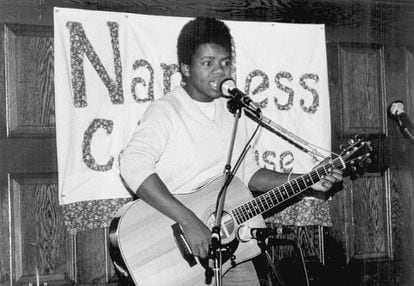36 years after its launch, Fast Car has finally reached first place in the charts. Tracy Chapman's enduring folk ballad, about a couple's struggle to escape poverty and find a better life, has increased its views by 241% – according to data published by Billboard– thanks to the impact obtained by his appearance at the Grammy Awards gala. Neither Miley Cyrus nor Taylor Swift, two of the night's big winners, managed to overshadow the impact of the return of Chapman, 59, who has long been away from public life and whose presence had not been announced. “When she agreed to come we thought it was too good to be true,” the executive producer of the gala, Ben Winston, confessed to the magazine. Rolling Stone. But the artist, with more than 30 million records sold worldwide, wanted to accompany the young man on stage. Luke Combswhich last year released a country version to present this anthem to a new generation and renew curiosity about the enigmatic author.
Ryan Dombal, music critic of Pitchfork Explain a S Fashion that “Anyone who has dreamed of leaving their past in the rearview mirror and aspiring to a fuller life can relate to Fast Car. As long as there are people struggling to make ends meet with the odds against them, the song will be there to give comfort, like an old friend.” The simplicity of the arrangements and instrumentation accentuate the timelessness of a song covered to the point of exhaustion and that has been rated by experts as the most suitable for testing the performance of headphones due to its frequency range and the quality of its recording.
Despite being highly respected in the music business, Chapman, who released her last studio album in 2008, has barely been seen at a couple of events in the last decade, establishing herself as one of the most elusive personalities in the industry. Hence the exceptional nature of her presence at the Grammy Awards. “Being in the public eye and under the spotlight has been and is uncomfortable for me, I am a little shy (…) Maybe I am not the most ideal person for this type of work,” she explained in an interview with The Irish Times in 2015, one of the last offered to date.
Those spotlights were aimed very quickly at Chapman and almost without her being able to prepare for the dazzle. Gifted with an innate talent for music, at the age of three she was already playing the ukulele – she also learned to play the organ and clarinet – and at eight she was composing her own songs with the guitar. Music was a basic fabric of a childhood marked by racial tensions in her native Cleveland and the abandonment of the nuclear family by her father, which forced her mother to raise her sister and her daughter alone. she. An excellent academic record earned her a scholarship that allowed her to attend university, enrolling in an anthropology degree. It was there, in the cafeterias and parks on campus, that Chapman gave her first public performances. A classmate, named Brian Koppelman, who would later become the renowned creator of series such as Billions, was so taken with her talent that he insisted on introducing her to his father, the head of a major record company. Although she was reluctant to start a professional career, Koppelman finally gave her a contract with Elektra Records.
A year after graduating, in 1988, the debut album Tracy Chapman and the single Fast Car They were released simultaneously, achieving unanimous success among the public – it sold six million copies in the United States alone –, academics – it won three Grammy Awards – and critics. David Browne, senior editor of Rolling Stone, confirms by email that its impact was instantaneous: “The revival of folk and acoustic music was a reaction to the dominance of electronic music on the charts in previous years and there was a desire for more direct and less produced pop.” The album became the best-selling album in more than a dozen countries and surpassed 20 million copies shipped.
But her popularity skyrocketed even more in June of that year, when she was invited at the last minute to replace Stevie Wonder at the tribute to Nelson Mandela held at London's Wembley Stadium. With a television audience of 600 million viewers, the image would be the perfect climax of a hypothetical film about her life: a 24-year-old newcomer replaces a pop legend and silences 74,000 people by singing about the longing to be happy, loved. and free with his guitar. “Being a young black woman – shy but determined, tender but stoic – at an anti-apartheid event positioned Chapman as the face of a new form of protest movement,” public he Financial Times. Her success paved the way for other artists and, in Dombal's words, “seeing a black woman with an androgynous aesthetic overturned preconceived ideas about what a singer with an acoustic guitar should look like.”
At the same time, Fast Car In recent years it has also spontaneously become a spontaneous lesbian anthem, although its author has never referred to her sexual orientation. Trish Bendix, columnist for The New York Times specialized in LGTBI culture, maintains to this medium that, beyond the fact that its performer has challenged gender and race clichés, the impact of the song on the group lies in its theme: “Leaving home in search of something bigger and different , but ultimately colliding with the ravages of daily life resonates powerfully with queer and trans people. It is a timeless journey, emotionally tense, but also hopeful.”

Getty Images)
#enigma #Tracy #Chapman #star #fled #fame #triumphs #years

